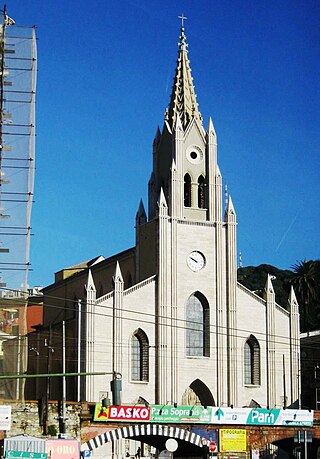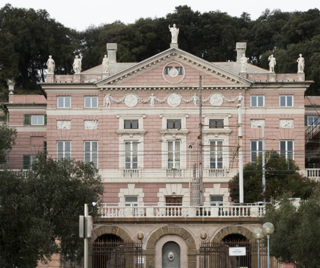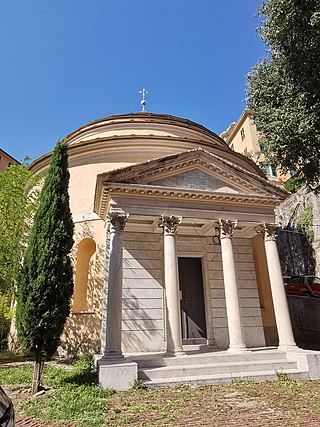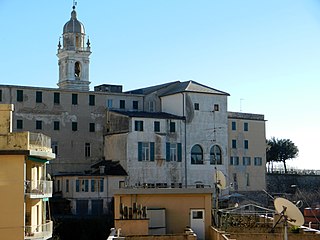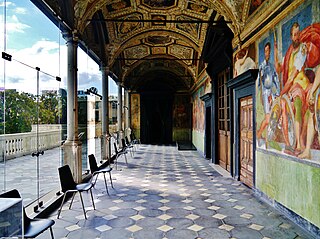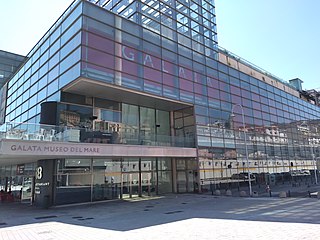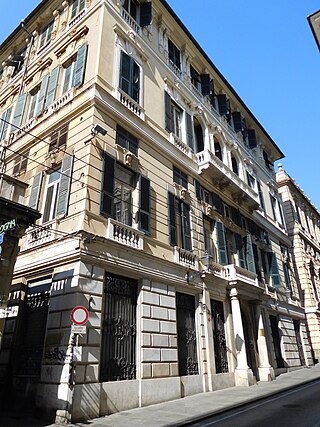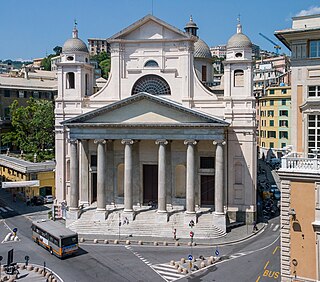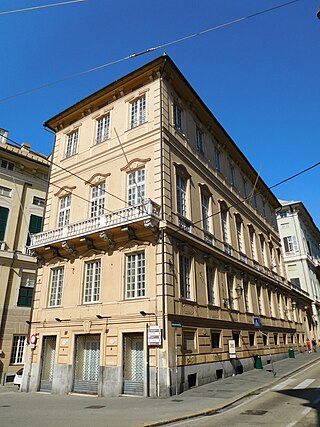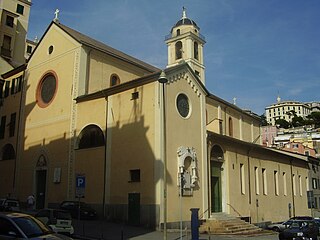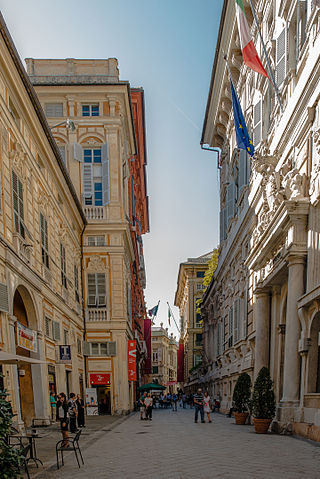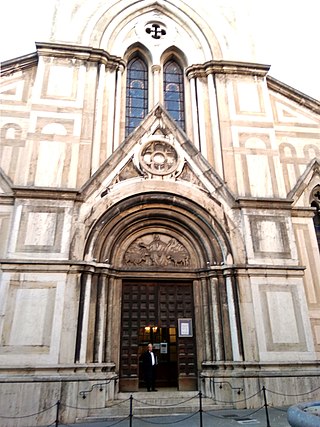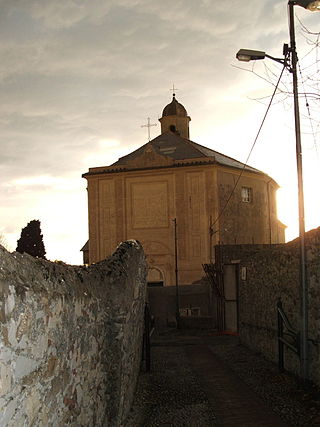Self-guided Sightseeing Tour #9 in Genoa, Italy
Legend
Guided Free Walking Tours
Book free guided walking tours in Genoa.
Guided Sightseeing Tours
Book guided sightseeing tours and activities in Genoa.
Tour Facts
6.3 km
289 m
Experience Genoa in Italy in a whole new way with our free self-guided sightseeing tour. This site not only offers you practical information and insider tips, but also a rich variety of activities and sights you shouldn't miss. Whether you love art and culture, want to explore historical sites or simply want to experience the vibrant atmosphere of a lively city - you'll find everything you need for your personal adventure here.
Activities in GenoaIndividual Sights in GenoaSight 1: Chiesa di San Teodoro
The church of San Teodoro is an Italian religious building in Genoa, Italy, located in the district of the same name that took its name from it. The original structure was one of the oldest in Genoa: the original Romanesque church, of which there was news from the tenth century, was demolished for urban planning reasons in 1870, and a new one was rebuilt not far away. The parish community is part of the San Teodoro-Oregina vicariate of the Archdiocese of Genoa.
Sight 2: Villa Rosazza
Villa Di Negro Rosazza is a villa in Genoa, Italy, located in Piazza Dinegro 3, in the district of San Teodoro, municipality II Centro-Ovest. It was built in 1565 for the Doge Ambrogio Di Negro or his son Orazio in an area that, at that time, was outside the city walls, in a panoramic position overlooking the sea. Passed to the Durazzo family, it was remodeled in neoclassical style at the end of the eighteenth century by the architect Tagliafichi. In the nineteenth century, the construction of the Turin-Genoa railway line compromised the integrity of the park and led to the construction of new access ramps to the street level.
Sight 3: Oratorio del Rosario
The Oratory of Our Lady of the Rosary is a Catholic oratory in Genoa, Italy, located in Salita San Francesco da Paola, in the district of San Teodoro. It is the seat of the confraternity of Our Lady of the Rosary and St. Theodore.
Sight 4: Santuario di San Francesco da Paola
The sanctuary of San Francesco da Paola is located in the Genoese district of San Teodoro, on a hill at 132 m above sea level in a panoramic position overlooking the city and the port.
Wikipedia: Santuario di San Francesco da Paola (Genova) (IT)
Sight 5: Villa del Principe
The Villa del Principe, Palazzo del Principe, or Palace of Andrea Doria in Fassolo is one of the main historical suburban villas of Genoa, Italy. It was built in the 16th century in an area that it is now located in the city center, but at the time of the construction of the villa was just outside of the city walls towards Capo di Faro and the Lanterna.
Sight 6: Galata Museo del Mare
The Galata - Museo del mare is a maritime museum in the Italian city of Genoa. It is the largest museum of its kind in the Mediterranean area and also one of the most modern in Italy. The museum is located on the grounds of the Porto Antico, in the Palazzo Galata in the Darsena district, where galleys were built in the Republic of Genoa era. It is close to downtown Genoa, the Port of Genoa, and within walking distance of Genova Principe train station and Darsena metro stop. It opened in 2004 as part of Genoa's 2004 European Capital of Culture celebration.
Sight 7: Palazzo Francesco Balbi Piovera
The palazzo Francesco Maria Balbi Piovera' is a building located in via Balbi at number 6 in the historical centre of Genoa, included on 13 July 2006 in the list of the 42 palaces inscribed in the Rolli di Genova that became World Heritage by UNESCO on that date. The building, also known by the name of palazzo Raggio from the name of the armor who purchased it in the 19th century, is today the seat of the Faculty of Letters of the University of Genoa.
Sight 8: Chiesa dei Santi Vittore e Carlo
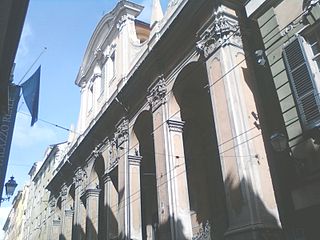
Santi Vittore e Carlo is a Baroque-style church on Via Balbi in central Genoa, Italy. Originally belonging to the Discalced Carmelite Order, the church was constructed in the shape of a Latin Cross between 1629 and 1635 from a design by Bartolomeo Bianco. Designs by Eugenio Durazzo were incorporated in 1743 with the construction of a façade.
Sight 9: Basilica della Santissima Annunziata del Vastato
The Basilica della Santissima Annunziata del Vastato is the Catholic cathedral of Genoa, northern Italy; its decoration employed the major baroque studios and artists in Genoa in the 17th century.
Wikipedia: Basilica della Santissima Annunziata del Vastato (EN)
Sight 10: Palazzo Gio Francesco Balbi
The Gio Francesco Balbi Palace, also known as the Balbi Cattaneo Palace, is a historic Italian building, located in Via Balbi 2, also overlooking Piazza della Nunziata, in the historic center of Genoa. It is one of the Palazzi dei Rolli that were designated, at the time of the Republic of Genoa, to host high-ranking guests during state visits on behalf of the Genoese government.
Sight 11: Chiesa di Nostra Signora del Carmine e Sant'Agnese
The church of Our Lady of Mount Carmel and St. Agnes is one of the historic churches of Genoa. It is located in the district known as the Carmine in via Brignole De Ferrari, a short distance from the central via Balbi; his parish community is part of the "Centro Ovest" vicariate of the archdiocese of Genoa. The prior of N.S. del Carmine has the title of abbot.
Wikipedia: Chiesa di Nostra Signora del Carmine e Sant'Agnese (IT)
Sight 12: Genoa: Le Strade Nuove and the system of the Palazzi dei Rolli
Genoa: Le Strade Nuove and the system of the Palazzi dei Rolli is a UNESCO World Heritage Site which includes a number of streets and palaces in the center of Genoa, in Northwestern Italy.The Strade Nuove are a group of streets built by the Genoese aristocracy during the expansion of the city at a time when the Republic of Genoa was at the height of its financial and seafaring power. These are Via Giuseppe Garibaldi and Via Balbi, later followed by Via Cairoli. The Palazzi dei Rolli are a group of palaces - most of which also date from the late 16th and early 17th centuries - which were associated to a particular system of ‘public lodging’ in private residences, whereby notable guests on State visit to the Republic were hosted in one of these palaces on behalf of the State.
Wikipedia: Genoa: Le Strade Nuove and the system of the Palazzi dei Rolli (EN)
Sight 13: Parrocchia N. S. delle Grazie e S. Girolamo
The church of Our Lady of Grazie and San Gerolamo is a cult building in Genoa. It is located between Corso Carbonara and Corso Firenze and is part of the Vicariate of Castelletto.
Wikipedia: Chiesa di Nostra Signora delle Grazie e San Gerolamo (IT)
Sight 14: Chiesa di San Nicola
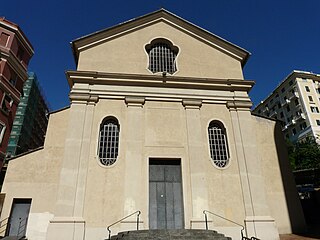
The church of San Nicola da Tolentino is a religious building in Genoa on the Madonnetta hill, on the way to the sanctuary of the Madonnetta, and its parish community is part of the Vicariate of Castelletto of the Archdiocese of Genoa.
Sight 15: Santuario della Madonnetta
The sanctuary of the Madonnetta or, more precisely, the sanctuary of Our Lady of the Assumption of Carbonara, is one of the main Marian sanctuaries in the province of Genoa.
Share
How likely are you to recommend us?
Disclaimer Please be aware of your surroundings and do not enter private property. We are not liable for any damages that occur during the tours.
GPX-Download For navigation apps and GPS devices you can download the tour as a GPX file.
